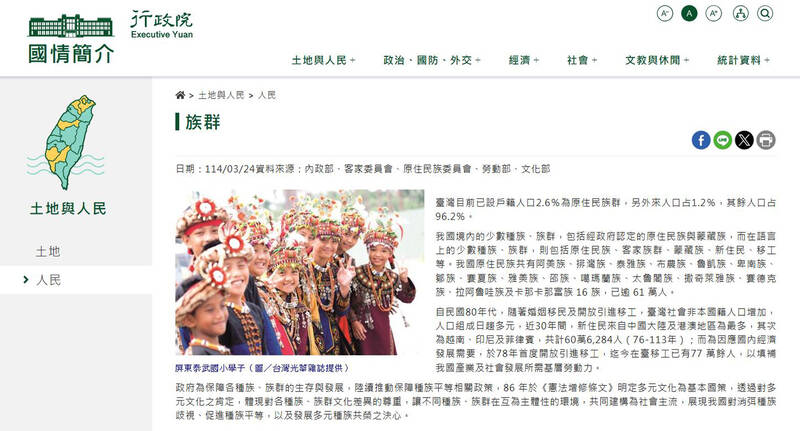The removal of the term “Han Chinese” from the Executive Yuan’s Web site, which has sparked an online backlash, was intended to improve ethnic equality in Taiwan based on advice from the Control Yuan and was not politically motivated, Cabinet spokeswoman Michelle Lee (李慧芝) said on Sunday.
A user on the Professional Technology Temple (PTT) online bulletin board on Saturday wrote that on March 24 a section on the Executive Yuan’s Web site about ethnic groups in Taiwan removed the term “Han Chinese.”
The current version of the site states that indigenous people make up 2.6 percent of registered households in Taiwan, while 1.2 percent were foreign nationals and 96.2 percent were “the rest of the population.”

Photo: screen grab from the Executive Yuan Web site
A screenshot of the site archived on March 17 on the Wayback Machine shows that it previously said that Han Chinese accounted for the largest portion of the population at 96.4 percent.
Soon after the PTT comments gained widespread media attention, the Chinese Nationalist Party (KMT) criticized the change as “cognitive warfare” against China by the ruling Democratic Progressive Party.
KMT Legislator Chen Ching-hui (陳菁徽) on Saturday called the change “absurd,” saying it recognized the ethnicity of minority groups comprising only 3.8 percent of the population, but referred to the 96 percent majority as simply “the rest.”
Such blurring of the nation’s ethnic composition is unhelpful and raises suspicions about the motive behind the change, she said.
Lee said the Department of Household Registration made the revision in response to a suggestion from Control Yuan member Antonio Hong (鴻義章) in December 2022, who said the previous description counterposed Han Chinese against indigenous people and new immigrants.
In the previous language on the site, the term “Han Chinese” encompassed Hoklo and Hakka people, as well as immigrants, Lee cited Hong as saying.
Such polarizing phrasing might hinder efforts to facilitate ethnic equality and eliminate racial discrimination, she cited Hong as saying, adding that he again proposed the revision in 2023.
The Executive Yuan updates the country profile on the Web site annually and uses terms related to ethnicity based on statutes such as the Household Registration Act (戶籍法), the Indigenous Peoples Status Act (原住民身分法) and the Immigration Act (入出國移民法), as well as demographic data, Lee said.
The term “more than 23 million people of Taiwan” refers to citizens of the Republic of China with a registered household, including foreign nationals, she said.
Indigenous people must register their ethnicity in accordance with the Indigenous Peoples Status Act and foreign nationals would be documented as a group based on their first-time household registration, she added.
However, the ethnic status of Hoklo or Hakka people, or minority groups such as Manchus, Mongolians or Tibetans, is not recorded and their numbers could not be calculated by category, Lee said.
As using “Han Chinese” as an umbrella term to encapsulate all these ethnic groups does not accurately reflect their ethnicity, it was replaced with “the rest of the population” to more objectively describe the demographic structure in Taiwan, she said.
The change was not politically motivated and should not be misinterpreted, Lee said.
Additional reporting by CNA

MAKING WAVES: China’s maritime militia could become a nontraditional threat in war, clogging up shipping lanes to prevent US or Japanese intervention, a report said About 1,900 Chinese ships flying flags of convenience and fishing vessels that participated in China’s military exercises around Taiwan last month and in January have been listed for monitoring, Coast Guard Administration (CGA) Deputy Director-General Hsieh Ching-chin (謝慶欽) said yesterday. Following amendments to the Commercial Port Act (商港法) and the Law of Ships (船舶法) last month, the CGA can designate possible berthing areas or deny ports of call for vessels suspected of loitering around areas where undersea cables can be accessed, Oceans Affairs Council Minister Kuan Bi-ling (管碧玲) said. The list of suspected ships, originally 300, had risen to about 1,900 as

DAREDEVIL: Honnold said it had always been a dream of his to climb Taipei 101, while a Netflix producer said the skyscraper was ‘a real icon of this country’ US climber Alex Honnold yesterday took on Taiwan’s tallest building, becoming the first person to scale Taipei 101 without a rope, harness or safety net. Hundreds of spectators gathered at the base of the 101-story skyscraper to watch Honnold, 40, embark on his daredevil feat, which was also broadcast live on Netflix. Dressed in a red T-shirt and yellow custom-made climbing shoes, Honnold swiftly moved up the southeast face of the glass and steel building. At one point, he stepped onto a platform midway up to wave down at fans and onlookers who were taking photos. People watching from inside

Japan’s strategic alliance with the US would collapse if Tokyo were to turn away from a conflict in Taiwan, Japanese Prime Minister Sanae Takaichi said yesterday, but distanced herself from previous comments that suggested a possible military response in such an event. Takaichi expressed her latest views on a nationally broadcast TV program late on Monday, where an opposition party leader criticized her for igniting tensions with China with the earlier remarks. Ties between Japan and China have sunk to the worst level in years after Takaichi said in November that a hypothetical Chinese attack on Taiwan could bring about a Japanese

The WHO ignored early COVID-19 warnings from Taiwan, US Deputy Secretary of Health and Human Services Jim O’Neill said on Friday, as part of justification for Washington withdrawing from the global health body. US Secretary of State Marco Rubio on Thursday said that the US was pulling out of the UN agency, as it failed to fulfill its responsibilities during the COVID-19 pandemic. The WHO “ignored early COVID warnings from Taiwan in 2019 by pretending Taiwan did not exist, O’Neill wrote on X on Friday, Taiwan time. “It ignored rigorous science and promoted lockdowns.” The US will “continue international coordination on infectious